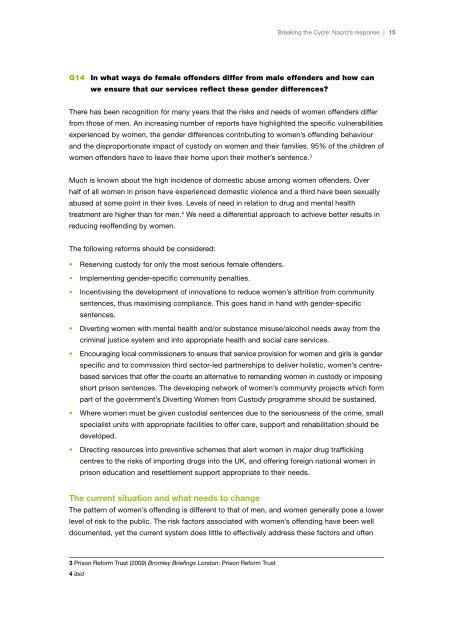Nacro's response to Breaking the Cycle Green Paper
Nacro's response to Breaking the Cycle Green Paper
Nacro's response to Breaking the Cycle Green Paper
Create successful ePaper yourself
Turn your PDF publications into a flip-book with our unique Google optimized e-Paper software.
<strong>Breaking</strong> <strong>the</strong> <strong>Cycle</strong>: Nacro’s <strong>response</strong> | 15Q14 In what ways do female offenders differ from male offenders and how canwe ensure that our services reflect <strong>the</strong>se gender differences?There has been recognition for many years that <strong>the</strong> risks and needs of women offenders differfrom those of men. An increasing number of reports have highlighted <strong>the</strong> specific vulnerabilitiesexperienced by women, <strong>the</strong> gender differences contributing <strong>to</strong> women’s offending behaviourand <strong>the</strong> disproportionate impact of cus<strong>to</strong>dy on women and <strong>the</strong>ir families. 95% of <strong>the</strong> children ofwomen offenders have <strong>to</strong> leave <strong>the</strong>ir home upon <strong>the</strong>ir mo<strong>the</strong>r’s sentence. Much is known about <strong>the</strong> high incidence of domestic abuse among women offenders. Overhalf of all women in prison have experienced domestic violence and a third have been sexuallyabused at some point in <strong>the</strong>ir lives. Levels of need in relation <strong>to</strong> drug and mental healthtreatment are higher than for men. We need a differential approach <strong>to</strong> achieve better results inreducing reoffending by women.The following reforms should be considered:• Reserving cus<strong>to</strong>dy for only <strong>the</strong> most serious female offenders.• Implementing gender-specific community penalties.• Incentivising <strong>the</strong> development of innovations <strong>to</strong> reduce women’s attrition from communitysentences, thus maximising compliance. This goes hand in hand with gender-specificsentences.• Diverting women with mental health and/or substance misuse/alcohol needs away from <strong>the</strong>criminal justice system and in<strong>to</strong> appropriate health and social care services.• Encouraging local commissioners <strong>to</strong> ensure that service provision for women and girls is genderspecific and <strong>to</strong> commission third sec<strong>to</strong>r-led partnerships <strong>to</strong> deliver holistic, women’s centrebasedservices that offer <strong>the</strong> courts an alternative <strong>to</strong> remanding women in cus<strong>to</strong>dy or imposingshort prison sentences. The developing network of women’s community projects which formpart of <strong>the</strong> government’s Diverting Women from Cus<strong>to</strong>dy programme should be sustained.• Where women must be given cus<strong>to</strong>dial sentences due <strong>to</strong> <strong>the</strong> seriousness of <strong>the</strong> crime, smallspecialist units with appropriate facilities <strong>to</strong> offer care, support and rehabilitation should bedeveloped.• Directing resources in<strong>to</strong> preventive schemes that alert women in major drug traffickingcentres <strong>to</strong> <strong>the</strong> risks of importing drugs in<strong>to</strong> <strong>the</strong> UK, and offering foreign national women inprison education and resettlement support appropriate <strong>to</strong> <strong>the</strong>ir needs.The current situation and what needs <strong>to</strong> changeThe pattern of women’s offending is different <strong>to</strong> that of men, and women generally pose a lowerlevel of risk <strong>to</strong> <strong>the</strong> public. The risk fac<strong>to</strong>rs associated with women’s offending have been welldocumented, yet <strong>the</strong> current system does little <strong>to</strong> effectively address <strong>the</strong>se fac<strong>to</strong>rs and often Prison Reform Trust (2009) Bromley Briefings London: Prison Reform Trust ibid
















